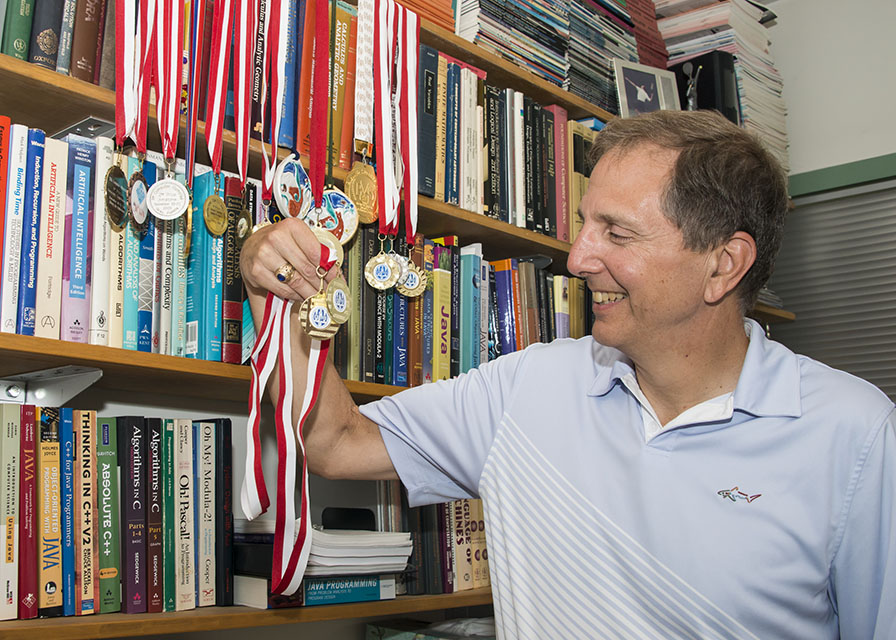Computer Science Professor Richard Lorentz Represents CSUN at Computer Olympiad
California State University, Northridge computer science professor Richard Lorentz is an Olympian, but not on the track or in the pool. He competes annually at the Computer Olympiad tournament, an international competition for game-playing computer programs, to test the latest programming.
“A human can play games, but how well can a computer play?” Lorentz asked rhetorically. “This is where programming comes in.”
The International Computer Games Association (ICGA) hosts the annual Computer Olympiad and determines its location. This summer’s competition was held in Leiden, Netherlands.
At this year’s tournament, Lorentz won gold medals in a game called Amazons for the sixth consecutive year, and he also captured a gold in a game called Breakthrough — bringing the total number of medals he’s won to 14 since 2001.
The Olympiad consists of 100 to 150 competitors in total, and there are usually 20 to 25 games, with anywhere from two programs competing to a dozen or more programs competing in each game. This year, Breakthrough had five programs competing and Amazons had four programs competing.
Lorentz is among the best competitors around, as there are three medals (gold, silver and bronze) awarded for every game at the Computer Olympiad, and he has won multiple gold medals.
Amazons is played on a board with 10 squares by 10 squares, and the objective of the game is to gain access to more empty squares than the opponent. Breakthrough is played on a checkered eight-by-eight square board, where the objective of the game is to get one of the player’s pieces to the opponent’s side of the board, similar to checkers — where the objective is to be the first to obtain a king.
One algorithm, or blueprint for writing a program, used in artificial intelligence for game-playing programs is called Monte-Carlo Tree Search (MCTS) and is especially effective in games such as Breakthrough and Amazons, Lorentz said. MCTS searches for the best move in a game by examining many possible sequences of moves, and each sequence can be thought of as a branch in a tree. The branch that looks the most effective to the computer is the move the program will choose.
It was 2001 when Lorentz decided to compete in his first Olympiad with his master’s students in Maastricht, Netherlands.
“My affinity for computer game programming especially grew when I came to CSUN, and I wanted to get master’s students interested in AI (artificial intelligence) programming,” he said. “In 2001, students were working in the program with me. We decided to compete to test our programs. It seemed like a really good educational opportunity.”
Today, Lorentz brings master’s students from CSUN to the Olympiad as part of their dissertation.
S.K. Ramesh — who is stepping down as dean of the College of Engineering and Computer Science and will become the director of AIMS2 (Attract Inspire Mentor and Support Students), which aims to increase the number of Latina/o and low-income students who graduate from CSUN with degrees from CECS undergraduate programs — called Lorentz a brilliant scholar and an incredible faculty member.
“A couple of years ago, I had the pleasure of presenting [Lorentz] with a Distinguished Engineering Educator Award from the Engineers Council, for transformative research in MCTS algorithms and seminal contributions in game-playing programming as an internationally acclaimed educator and scholar in computer science,” Ramesh said. “His record in Computer Olympiads is simply unbelievable. CSUN is so lucky to have someone of his caliber in our ranks.”
Lorentz is already preparing for next year’s Computer Olympiad by researching how to modify algorithms and find even better moves.
“The way we prepare for the Olympiad is to find ways to make the programming better, more efficient,” he said.
The location for Lorentz’s 13th tournament is to be announced, but he explained what keeps him coming back.
“There are so many factors why I keep coming back to compete,” Lorentz said. “There’s the thrill of the competition, sense of camaraderie, making friends and being able to represent CSUN worldwide.”
For more information on the Computer Olympiad, please contact richard.lorentz@csun.edu.


 experience
experience